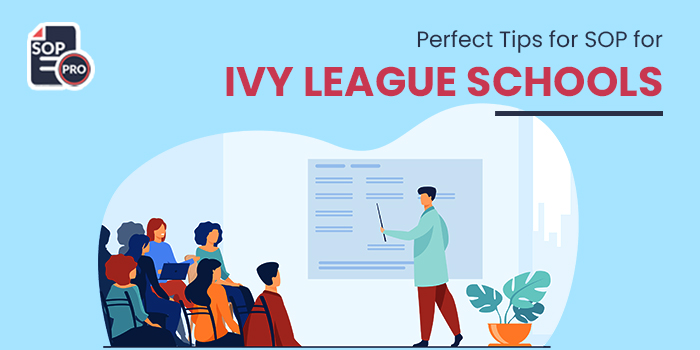A statement of Purpose (SOP) or the personal statement is still by far the most important part of the application process, and it sets applicants apart. It gives the admissions committee a glimpse into one’s past, and it serves as a kind of narrative so that the admissions committee can review the applicants. In essence, a well-written statement of purpose can help one use even their flaws to their advantage. Furthermore, it has the potential to persuade the admissions committee. Every year, millions of students go around the internet looking for SOP writing tips and tricks to crack an excellent SOP for Ivy league schools that not just makes a case for them but also stands out from the rest. In this blog, we elaborate and go over the basic pointers and key factors about SOPs and then move on to the extra additions that one can make to make a statement.
Some students and candidates get overburdened by the pressure of writing an SOP and miss out on the essential details that the interviewer generally seeks. Thus, it becomes necessary to answer a few basic questions about their background.
Then how do you make your SOP for the Ivy league stand out?
A few fundamental changes from the usual SOP style can make a lot of difference.
Many say that if you aim to graduate from an Ivy league school, you need to get with the preparations from high school itself. The pride of an Ivy league degree and the sense of achievement after receiving it can make any student go crazy, in a good way! An SOP can be the deciding factor whether your dreams may come true or not, so it is always advised to take this write-up seriously and draft it with as much honesty as possible.
1. Stories make your case, not statements
Everybody connects with stories, a lot more than statements, at least. Therefore, it becomes imperative for a candidate to weave a story, touching every significant aspect of their life that an interviewer needs to know.
The story must also have a flow. Of course, it can’t be as engaging as a beautifully written novel but must still engage the reader and not force them to skip through. This is a key tip for a great SOP for Ivy league institutions.
Plan for your SOP and act according to it. A great way to start your introduction is to share an incident that piqued your interest in your subject.
Make a thorough list of your relevant accomplishments and awards include a few skills that you learned along the way, as well as your motivation for enrolling in the course and attending the institution. Starting the SOP in an engaging and story-like fashion will grasp the reader’s attention, and it will be contributing factor in your selection as well.
2. Being Specific
When asked to write a story about themselves, many candidates get lost in writing a good story. They often miss out on details about themselves, sometimes even missing the personal part of it entirely.
Being precise helps the reader understand the candidate better and allows them to judge a candidate’s credibility.
It’s also important to not throw ideal sentences like “I want to change the world” or use over-the-top cheesy lines to impress the reader because they will surely see through these lines, and the candidate will lose credibility.
3. Make your essay a little more personal
The most common mistake many applicants make when they draft their SOP for Ivy league institutions is preparing a basic template or outline for their statement of purpose and then simply changing the relevant names and facts if they apply to more than one university. The rest of the sentence, however, is a replica.
An SOP needs to be customized for that particular university or Ivy league school and should align with the school’s definite sets of cultures or visions.
4. How formal is too formal?
Using a formal tone of language is an ideal choice for these applications, but how formal can one get before the reader loses any interest that they may have had half way through the application?
Assume you are speaking with your college’s dean or director. What would your language sound like to the reader? That’s how your mission statement should say. A little humor and comedy here and there is fine, but don’t try to come out as overly funny or too savvy.
Try to avoid any intended jokes or hilarious comments in your essay. After all, the end goal of an SOP isn’t to amaze people or make them laugh with your comedy but to pursue a graduate degree. You can be witty, but try not to overdo it. So, it’s absolutely fine as long as what you write makes the reader smile.
However, it shouldn’t force the admissions committee to dismiss your application because you didn’t appear to be serious enough.
5. Staying original goes a long way!
Yes, the first paragraph precisely talks about you! But just because they asked you to write stories, you may feel compelled to “invent” stories out of thin air.
Try to avoid sounding fake at all costs in your SOP for Ivy league schools. Only write great stories if you have great stories, to begin with, in the draft. Some people may have come from ordinary homes, lived ordinary lives, and achieved nothing extraordinary.
It’s perfectly fine. Don’t write it if you don’t have something significant to say. Be ordinary and write ordinary stories.
6. Be positive and confident about the setbacks in your life
Many students have problems such as gaps in their academic career or poor performance at a stage.
The usual instinct is to try and find ways around these, and we highly recommend that you instead address these issues genuinely.
Instead of defending oneself, you should focus on the true causes of the problems, as well as ‘how’ you conquered the circumstance and ‘what’ you learned from it.
This will leave a lasting impression on the reader and help you use your shortcomings to your advantage.
Sure, you should brag about your best grades and accomplishments. However, if you’ve had any inconsistencies or poor grades, you must address these as well.
Give reasonable explanations for what happened and how you plan to avoid it from happening again. And also, how you learned from your mistakes.
7. Be thorough with your research
Doing homework is crucial to consider while writing a statement of purpose.
Before writing the essays, you should thoroughly research all of the universities you are applying to and make a note of everything you appreciate about each one. The majority of students writes generic sentences. No, that’s not the way it’s done.
Many applicants utilize the same (SOP) for all of their applications. However, you must demonstrate that you are really interested in attending the university and that you have conducted all necessary studies before making your decision.
So, do your study and learn about the course, how it matches your talents, the professors and the university, and how they may assist you in honing your skills.
You don’t have to keep reminding the admissions committee about how excellent their college is. But you should tell them just what it is about them that makes you want to be there.
It’s crucial and essential to pay attention to the details.
8. Proofread the write-up before submitting
Be clear and remember that your statement of purpose is a representation of ‘you’ as a person, and it speaks for you.
Avoid mistakes, misplaced commas and semicolons, overused quotations, overly wordy, too many complex words and sentences, and too direct as a high priority. Take care. When it comes to writing your SOP for Ivy league school, be a perfectionist.
Once you’ve prepared your SOP, you must rewrite and evaluate it to ensure its quality.
It demonstrates how serious you are about attending a particular college.
And once you’ve completed everything, don’t forget to ask your friends and family to evaluate your statement of purpose and to criticize it appropriately so you don’t submit a less-than-perfect copy of your statement. Make and draft it yourself, and then share it with a few trusted friends for an unbiased opinion. To ensure its quality, you might consult experienced SOP writers in India.
Conclusion
As a sign-off note, it is best if you stick to the basics and the original outline. Don’t try to rewrite your entire family history. Don’t give out any personal, familial or financial information, and if you’re seeking scholarships, you’ll need to submit a separate application. Talk about learning opportunities rather than beating around the bush, just trying to finish the word limit. Do not go above the word limit. Be direct and avoid flattering words. Excessive use of technical words and phrases should be avoided. Also, dishonesty in your Statement of Purpose for Ivy league colleges may result in rejection. Avoid using fancy typefaces or brightly colored backdrops. Do not state that this was not your first choice of institution. When it comes to comedy, be careful; it might backfire!
We, at SOP Pro provide the best SOP writing Services in India. If you are not confident enough to write SOP for such prestigious colleges by yourself, you can connect with our team. You’ll get well-written Statement of Purpose which help you in joining one of your dream colleges.



